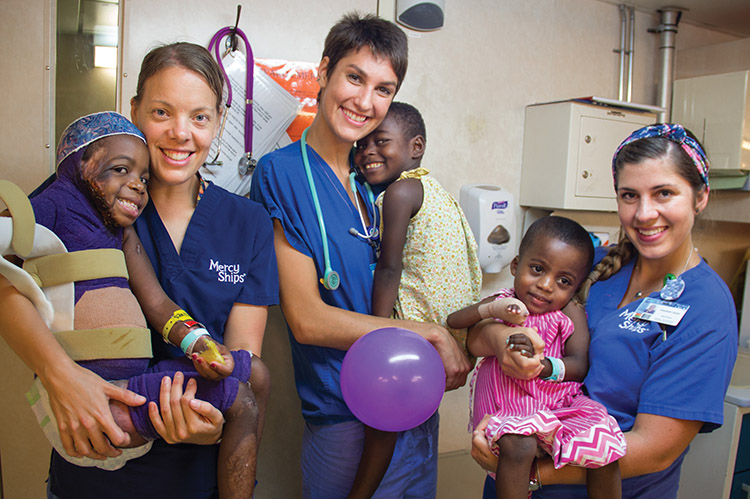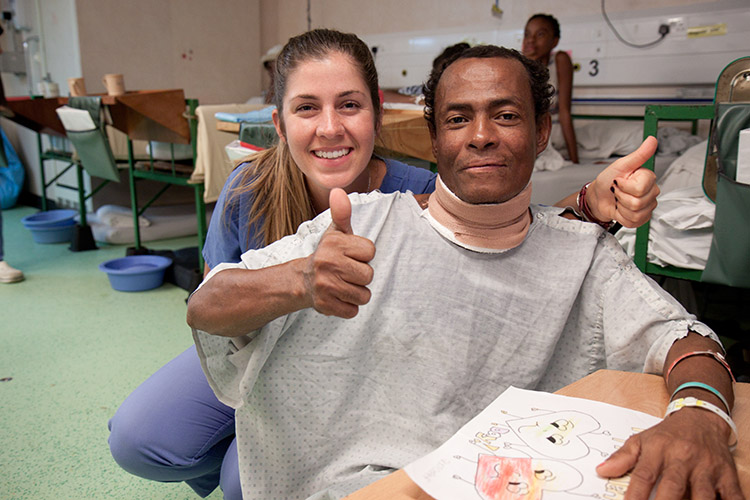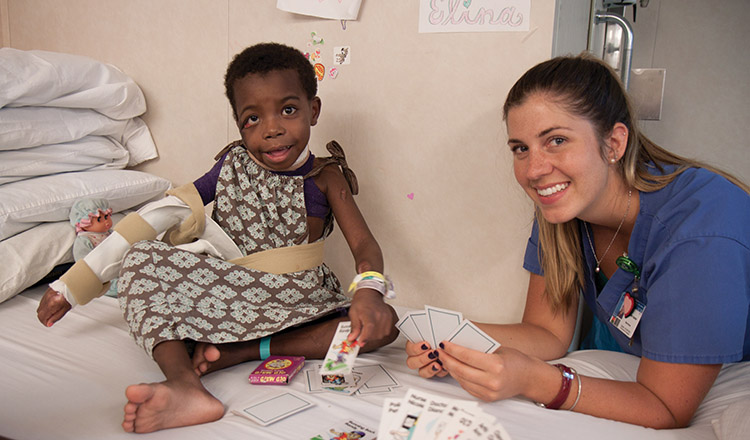It’s no surprise that Elizabeth Harter (HHS’12) found herself bringing hope and healing to residents of developing nations lacking adequate medical care — her grandparents, aunt, and uncle have spent years as overseas missionaries and imparted a passion for faith, sacrifice, and adventure. “I felt called to serve the forgotten, to take care of people who would otherwise not receive medical care,” she says. “When you have a love for others, you feel compelled to give.”
After graduating from Purdue with a nursing degree, Harter worked professionally in West Lafayette, Indiana, and Nashville, Tennessee, for a few years. But she was intrigued by volunteer outreach and dreamed of taking her nursing skills abroad to vulnerable communities. While exploring international opportunities, she discovered a program called Mercy Ships.
Founded by Don Stephens, Mercy Ships has been delivering free medical care to some of the world’s poorest countries since 1978. An international, faith-based organization, the charity works with host nations to offer dental treatments, palliative care, and surgical procedures such as tumor removal, cleft lip and palate reconstruction, obstetric fistula repair, and orthopedic correction — all aboard former cargo and passenger ferries. Why ships? Researchers found that more than 50 percent of the world’s population lives within 100 miles of a coast; docking outside port cities is an efficient way to provide healthcare services to a large number of people.
Nervous to venture beyond the familiarity of her Nashville life but excited to pursue a newfound calling, Harter applied and was accepted as a Mercy Ships volunteer in Madagascar, Africa. She spent 10 months in Tamatave before heading to West Africa for a new assignment in Cotonou, Benin. Currently stationed in Douala, Cameroon, she calls Africa Mercy, the world’s largest nongovernmental hospital ship, home. With a volunteer crew of around 400 and a bank, post office, library, and café, the 16,500-ton refitted Danish rail ferry can feel like a tiny city. “I love the constant hum of people and the community,” she says. “Being here with the same mind and purpose bonds us in a special way.”

Four months prior to Africa Mercy’s scheduled docking in Cameroon, Harter arrived as part of an advance team to establish hospital programs and protocols with the local government, agencies, and medical providers. Her roles on the vessel include orthopedic trauma nurse, ward nurse, and clinical ward educator. As a ward educator, she leads the orientation and training for new nurses, day crews, and translators and facilitates continuing-education services for medical staff. Harter expresses great admiration for her crewmates. “I work alongside the most talented surgeons, doctors, nurses, and therapists in the world,” she says. “They challenge me to be better — to see past the medical issues and view the brokenness of the heart and spirit as top priority.”
Life on a ship in a foreign country presents certain difficulties: occasional seasickness, claustrophobia, language barriers (Harter had to brush up on French and nautical terminology), routine fire drills, and two-minute showers. Over the course of three years, she has returned to the United States only twice for less than a month each time. While she constantly misses family and friends, Harter finds an immense fulfillment in her work. “It’s a sacrifice to give up the comforts of home and live in a developing nation, but it’s also such a joy. Watching the transformation of lives and experiencing new cultures is incredible.”
Harter witnessed one of those transformations in Ernest, a 27-year-old man afflicted with a massive tumor on his jaw. In more developed countries, similar tumors would be caught very early; when the necessary care is not available, they become life-threatening issues — even if benign. Ernest arrived onboard fearful, downcast, and with a towel around his face. “Patients come to the ship and can hardly look you in the eye due to the shame that has been placed on them by their families and communities,” Harter says. “But by the time they leave us, they are smiling, laughing, and encouraging new patients.”

Sure enough, Ernest was revolutionized by his successful surgery; catching sight of himself in a mirror, he marveled at the change and joked that he was so handsome he could get married. “Many men from my village have tumors like this, but they were too scared to come to the ship,” he says. “They told me I would die. I couldn’t wait to go back and show them that Mercy Ships has given me new life.”
That sense of newfound hope is why Harter and thousands of other volunteers from more than 40 countries have dedicated their time and aid to Mercy Ships. It’s estimated that as many as five billion people lack access to safe, affordable surgical and anesthesia services worldwide. With that in mind, the organization continues to help residents long after the crew has departed by creating capacity-building projects that help strengthen the standards of care within local medical ecosystems.
Harter often reflects upon the lasting impact of service, especially during the bittersweet moments of a patient’s departure. “Saying goodbye never gets easier,” she says. “When my time with patients comes to an end, my heart bursts with excitement for them, thanksgiving for healing, and sadness all at the same time. I am beyond blessed to have been entrusted with their care, and I will carry their smiles and hear their laughter in my memory forever.”

